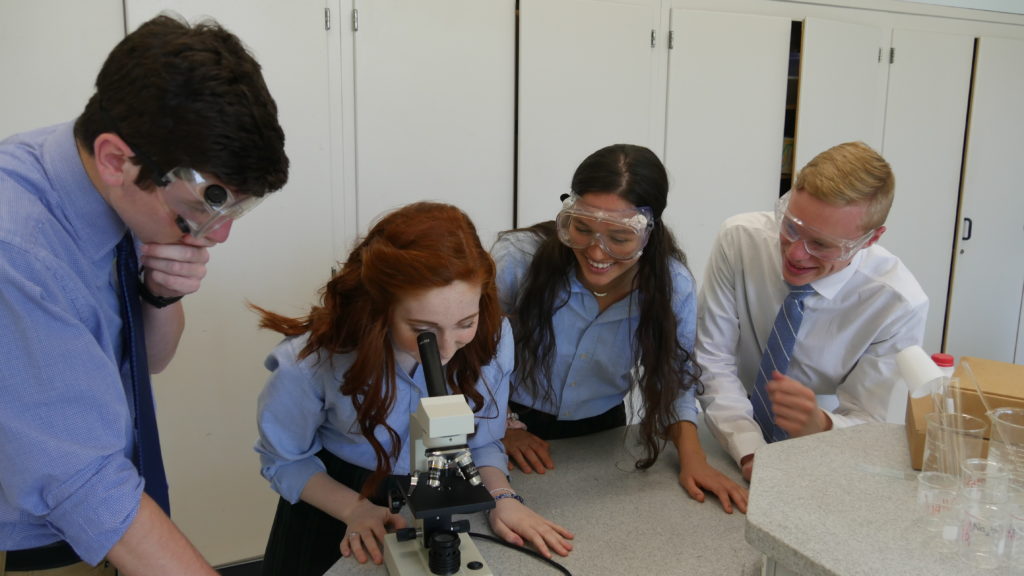St. Mary’s presents STEAM Challenges
In today’s world, Science, Technology, Engineering, Arts, and Mathematics (STEAM) is everywhere. A strong STEAM background gives students the opportunity to apply lessons to their daily lives and potentially select careers in this rapidly growing field.
Sophomores are required to register and successfully complete at least two STEAM Challenges. There are eight STEAM Challenges during the year, so students can choose the challenges they are most interested in and are welcome to participate in more than two projects.
Should a student fail to successfully complete two STEAM Challenges, that student will not receive credit for their sophomore science course. All challenges will be graded on a pass/fail basis. Criteria for grading each project will be shared at the beginning of the project.
STEAM Challenges
Below is a list of descriptions of each of the STEAM Challenges for the school year. The top three projects from each challenge will be displayed in the St. Mary’s Top Engineers showcase, as well as at the end of the year symposium, STEAM-FEST!
Egg-o-Naut
Students will design and build a soda bottle rocket that will carry an egg as its passenger. The rocket must reach a height of at least 20 feet and the egg must not break on the rocket’s return back to Earth. Students are free to use additional recyclable materials to construct fins to attach to the rocket and a cabin for the egg. Bonus points will be awarded to students who successfully separate the egg from the rocket before landing and rockets that obtain the highest height without breaking the egg.
Build A Wind Turbine
Students will be provided with the basic components for a miniature wind turbine. Using only these and other recyclable materials, students will compete to construct the most efficient wind turbine. Efficiency will be based on height, weight, blade design, and electrical output. Bonus points will be awarded to students whose wind turbines are the smallest yet produce the greatest electrical output.
Game Developer Challenge
Students will create a video game using the application Scratch, which is a programming language and online community where users can create their own interactive stories, games, and animations, with the goal of teaching fourth grade students a math concept. Students are free to choose which math concept they would like to teach. The game must include an introduction and directions, ask at least five questions, offer helpful hints, keep score, track the user’s progress, and have a conclusion. Games will be subjected to testing in an actual fourth grade classroom and be evaluated by fourth grade students. Bonus points will be awarded to students who align the game with the fourth grade math curriculum standards and receive positive feedback from the fourth grade students.
School of Rock
Students will design and construct at least one instrument that will be used to play a recognizable song. Students can use recyclable materials or the 3D printer to build their instruments. The instrument must be able to play a variety of notes with definite tones and frequencies. Bonus points will be awarded to students who form a band and play a song together and/or compose their own piece of music.
Make ‘n’ Wear
Students will design at least three items of wearable art. They will then choose the best of their designs to construct using either the 3D printer or recyclable materials. Students will have to decide which material(s) to use to produce their wearable design in order to estimate the cost of production. Students will then provide an estimated retail price. Bonus points will be awarded to students who design the most cost efficient item.
Mousetrap Car Derby
Students will build a mousetrap car using recyclable materials and a mousetrap for power. The mousetrap must provide the thrust; the design and all other aspects of the car will be at the students’ discretion. Bonus points will be awarded to students whose cars drive in a straight line, travel the furthest distance, and achieve the greatest speed.
Bridging the Gap
Students will build a Truss bridge using only balsa wood and glue. The bridge will need to have a certain clearance and length which will be specified. The bridge must also be designed to hold weight. Bonus points will be awarded to students whose bridges withstand the greatest amount of weight without breaking, bridges that hold the greatest amount of weight yet have the smallest mass, and bridges that endure earthquake-like conditions.
Easy Bake Solar Oven
Students will design and construct a solar powered oven. Students have the freedom to design their ovens however they choose, but can only use recyclable materials to build their ovens. Students will then use their ovens to cook a meal. A greater description of what constitutes a meal will be provided at the start of the project. Bonus points will be awarded to students whose ovens thoroughly cook the meal to optimum temperature without the meal being undercooked or burned.





